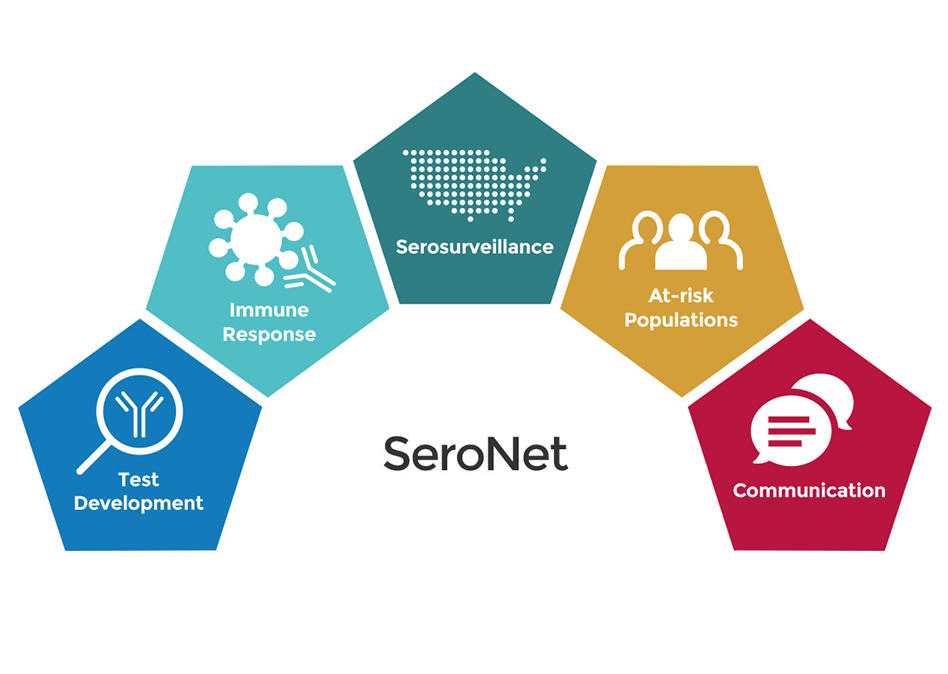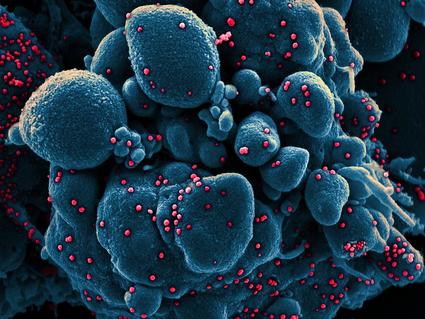NCI Serological Sciences Network for COVID-19 (SeroNet)
The NCI Serological Sciences Network (SeroNet) is a coordinated effort to expand the nation’s capacity for SARS-CoV-2 serologic testing on a population-level and advance research on the immune response to SARS-CoV-2 infection and COVID-19 vaccination among diverse and vulnerable populations.
Research conducted as part of SeroNet aims to answer questions such as:
- Why do some people who are exposed to SARS-CoV-2, the virus that causes COVID-19, get sick and others don’t?
- Do cancers or autoimmune diseases affect the immune response to a COVID-19 vaccine?
- Why do people with certain health conditions, such as cancer, diabetes, or heart disease, have an increased risk of developing severe illness from COVID-19?
- What is the prevalence of SARS-CoV-2 infection in the United States across age groups, racial/ethnic groups, and urban and rural populations?
- Why do some people who are infected with SARS-CoV-2 have severe symptoms and others have mild symptoms?
- Do COVID-19 vaccines protect against severe infection from different viral variants?
- What genetic and environmental factors affect the immune response, and how long does immunity last?
A list of publications from SeroNet-supported research can be found on PubMed.
The quarterly newsletter provides the latest clinical and translational serology news from the NCI Serological Sciences Network.
SeroNet is led by NCI, in close collaboration with the National Institute of Allergy and Infectious Diseases (NIAID) and other parts of the National Institutes of Health and the Department of Health and Human Services, and involves 25 of the nation’s top biomedical research institutions.
The network was established using funds from an emergency appropriation of $306 million to NCI “to develop, validate, improve, and implement serological testing and associated technologies.” Lessons learned from SeroNet research can be applied immediately and may prove valuable to public health beyond the current pandemic.
The major components of the network are:
- Serological Sciences Centers of Excellence
NCI has awarded eight institutions U54 grants to conduct multiple research projects to characterize the immune responses to coronavirus infection and vaccination and to learn what drives immune response, disease progression, and protection against future infection.
- Research Projects in SARS-CoV-2 Serological Sciences
NCI awarded researchers at 13 institutions U01 grants to conduct research projects on basic and applied serological research.
- Serological Sciences Network Capacity Building Centers
NCI, through the Frederick National Laboratory for Cancer Research (FNLCR), has awarded subcontracts to four research institutions to develop serological assays to test for coronavirus antibodies and to conduct serosurveillance studies.
- FNLCR Serology Lab
NCI has expanded the HPV Serology Lab at FNLCR to conduct COVID-19 serology research. Since May 2020, the lab has been partnering with the Food and Drug Administration to conduct independent evaluations of commercially available antibody test kits to ensure that antibody tests available to the public are accurate and reliable. In the longer term, the lab is conducting research to understand what it means to be seropositive (for example, is an individual resistant to reinfection?) and to contribute to seropositivity research projects, including conducting a long-term clinical trial of COVID -19 in people with cancer. The serology lab has also developed the Human SARS-CoV-2 Serology Standard, a pool of plasma from four donors with antibodies to SARS-CoV-2. The FNLCR standard is available by request to labs conducting COVID-19 antibody testing to enhance cross-study comparisons.
- SeroNet Coordinating Center
Managed by FNLCR under NCI’s direction, the coordinating center facilitates activities and fosters collaboration across all SeroNet components. Data generated by SeroNet investigators are shared via ImmPort after publication.
SeroNet investigators have also created guidance documents for researchers conducting studies on the immune response to vaccines and vaccine boosters to encourage harmonization across studies and to allow for cross-study comparisons. The available documents include study design templates, standard operating procedures, and common data elements.

